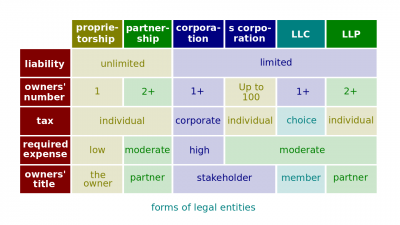Difference between revisions of "Legal partnership"
| (3 intermediate revisions by the same user not shown) | |||
| Line 1: | Line 1: | ||
| − | [[Legal partnership]] ( | + | [[File:Org-forms.png|400px|thumb|right|[[Legal entity]]]][[Legal partnership]] (sometimes, simply, [[partnership]]; however, [[partnership]] may also refer to [[strategic alliance]]) is the [[partnership]] of two or more persons who act as co-owners of a business. |
| Line 7: | Line 7: | ||
According to [[Financial Management Theory and Practice by Eugene F. Brigham and Michael C. Ehrhardt (13th edition)]], | According to [[Financial Management Theory and Practice by Eugene F. Brigham and Michael C. Ehrhardt (13th edition)]], | ||
:[[Partnership]]. A partnership exists when two or more persons associate to conduct a business. | :[[Partnership]]. A partnership exists when two or more persons associate to conduct a business. | ||
| + | According to [[Fundamentals of Financial Management by Eugene F. Brigham and Joel F. Houston (15th edition)]], | ||
| + | :[[Partnership]]. An unincorporated business owned by two or more persons. | ||
==Related concepts== | ==Related concepts== | ||
Latest revision as of 17:20, 11 December 2020
Legal partnership (sometimes, simply, partnership; however, partnership may also refer to strategic alliance) is the partnership of two or more persons who act as co-owners of a business.
Definitions
According to College Accounting: A Practical Approach by Slater (13th edition),
- Partnership. The association of two or more persons who act as co-owners of a business.
According to Financial Management Theory and Practice by Eugene F. Brigham and Michael C. Ehrhardt (13th edition),
- Partnership. A partnership exists when two or more persons associate to conduct a business.
According to Fundamentals of Financial Management by Eugene F. Brigham and Joel F. Houston (15th edition),
- Partnership. An unincorporated business owned by two or more persons.
Related concepts
- Accounting (alternatively known as accountancy) is management of financial data, information, and knowledge about financial transactions of legal entities. Accountancy tends to include bookkeeping and, depending on a particilar enterprise, may also include quatitative analysis of financial data in the bookkeeping system and/or business intelligence.
